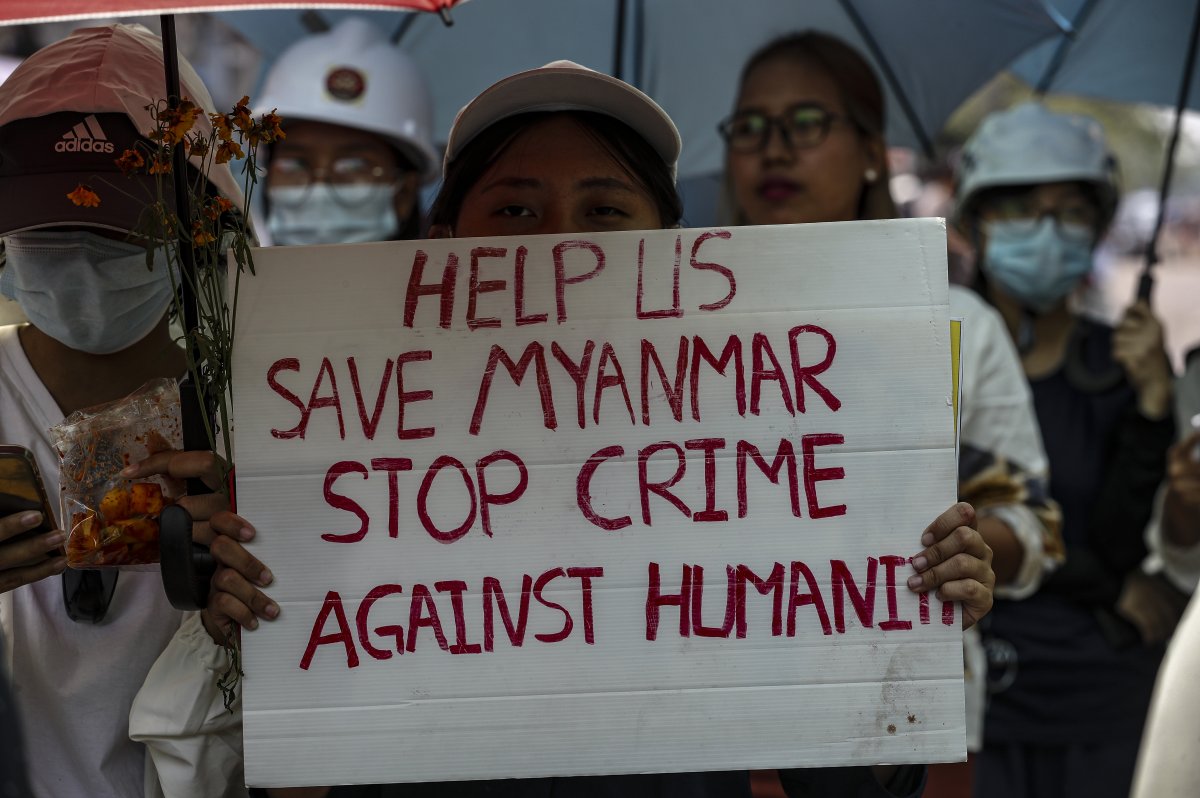Britain And Australia's Myanmar Sanctions: A Critical Analysis Of Their Purpose

Table of Contents
The Stated Objectives of Britain and Australia's Myanmar Sanctions
The stated objectives of Britain and Australia's Myanmar sanctions are multifaceted, aiming to address the crisis on multiple fronts.
Pressuring the Myanmar Military Junta
A primary goal of these Myanmar sanctions is to financially cripple the military junta, limiting its capacity to perpetuate violence and oppression. This is achieved through various measures:
- Asset freezes: Targeting the assets of key military leaders and their associated businesses within both countries' jurisdictions.
- Travel bans: Restricting the movement of individuals implicated in human rights abuses, preventing them from accessing international financial systems and resources.
- Arms embargoes: Preventing the supply of weapons and military equipment to the Myanmar military.
For example, the UK has targeted individuals like Min Aung Hlaing, the head of the military, and numerous entities linked to the Tatmadaw (Myanmar Armed Forces). Official government statements consistently highlight the aim of reducing the junta's access to resources needed to fuel its campaign of violence.
Protecting Human Rights and Promoting Democracy
Beyond pressuring the military, Britain and Australia's Myanmar sanctions aim to protect human rights and promote a democratic transition in Myanmar. The sanctions are intended to:
- Target businesses involved in human rights violations, such as those profiting from forced labor or complicit in the persecution of ethnic minorities.
- Support independent media and civil society organizations working to document human rights abuses and advocate for democratic reform.
Reports from Amnesty International and Human Rights Watch, documenting widespread human rights violations, including extrajudicial killings, torture, and sexual violence, provide a context for understanding the rationale behind this aspect of the sanctions regime.
Supporting the National Unity Government (NUG)
Britain and Australia's Myanmar sanctions also play a role in supporting the NUG, the shadow government representing the opposition to the military junta. This support is manifested through:
- Targeted exemptions from sanctions for humanitarian aid and assistance channeled through the NUG.
- Diplomatic recognition and engagement with the NUG, offering legitimacy and support to its efforts.
However, the challenges of effectively channeling aid and support to the NUG amidst the ongoing conflict and the complexity of the situation on the ground must be acknowledged.
The Impact of Sanctions on the Myanmar Economy and Population
The impact of Britain and Australia's Myanmar sanctions on Myanmar's economy and population is complex and multifaceted, exhibiting both intended and unintended consequences.
Economic Consequences
The sanctions have undoubtedly had a significant negative impact on Myanmar's already fragile economy:
- Reduced foreign investment and trade.
- Increased inflation and unemployment.
- Disruption to key sectors like tourism and manufacturing.
Economic reports from organizations like the Asian Development Bank reveal a significant contraction in Myanmar's GDP since the imposition of sanctions. However, measuring the precise impact solely attributable to sanctions is difficult due to the pre-existing economic vulnerabilities and the complex interplay of various factors.
Humanitarian Impact
The humanitarian consequences of the sanctions are a major concern:
- Increased food insecurity and malnutrition, particularly in conflict-affected regions.
- Reduced access to essential healthcare services.
- Disruptions to education for vulnerable populations.
Reports from UN agencies such as the World Food Programme highlight the growing humanitarian needs within Myanmar, with sanctions potentially exacerbating existing vulnerabilities. The delicate balance between targeting the military regime and minimizing harm to civilians is a central challenge.
Effectiveness in Achieving Stated Objectives
Assessing the overall effectiveness of Britain and Australia's Myanmar sanctions in achieving their stated objectives remains a complex undertaking. While some progress in isolating the military junta can be observed, the situation is far from resolved:
- The military regime continues to maintain significant control over the economy and security apparatus.
- Human rights abuses persist, albeit potentially at a modified scale due to resource constraints.
- The long-term impact on democracy and the development of Myanmar remains uncertain.
Evidence suggests that the sanctions have had a considerable economic impact and may have limited the junta's capabilities somewhat; however, evaluating their overall effectiveness requires a nuanced approach, accounting for both positive and negative outcomes.
Alternative Approaches and Future Strategies
While sanctions play a role, a more holistic approach is necessary to resolve the crisis in Myanmar.
Diplomatic Engagements
Parallel diplomatic efforts are crucial. Engaging in dialogue with regional and international actors, including ASEAN members, can create avenues for de-escalation and negotiation. However, the limited success of past diplomatic initiatives highlights the significant challenges involved.
Targeted Sanctions vs. Broad Sanctions
A shift towards even more precisely targeted sanctions, minimizing harm to the civilian population while maximizing pressure on the military elite, deserves consideration. Broad sanctions, while intended to exert pressure, can inadvertently harm civilians, undermining support for the sanctions regime.
International Cooperation
Strengthened international cooperation is essential. A coordinated approach among countries implementing sanctions, coupled with a unified stance on human rights and democratic principles, can amplify the impact and effectiveness of the measures. The experience of international sanctions regimes in other contexts suggests that concerted global action is often more effective.
Conclusion: A Critical Assessment of Britain and Australia's Myanmar Sanctions
Britain and Australia's Myanmar sanctions, while aiming to pressure the military junta, protect human rights, and support the NUG, have had a complex and multifaceted impact. While some progress in limiting the junta's resources may have been achieved, the humanitarian consequences and the overall effectiveness of achieving the stated objectives remain open to debate. The difficulty lies in balancing the need to exert pressure on the military with the imperative of minimizing harm to the civilian population. Further research is needed to fully understand the long-term impact of Britain and Australia's Myanmar sanctions and explore more effective strategies to address the ongoing human rights crisis. A comprehensive approach that combines targeted sanctions with robust diplomatic efforts and a focus on humanitarian assistance is crucial for achieving lasting peace and stability in Myanmar. A reevaluation of the current strategy regarding Britain and Australia's Myanmar sanctions, perhaps focusing on more targeted approaches and strengthening international cooperation, is essential for a more effective response to this ongoing crisis.

Featured Posts
-
 Identifying And Analyzing The Countrys Newest Business Centers
May 13, 2025
Identifying And Analyzing The Countrys Newest Business Centers
May 13, 2025 -
 Top 10 Efl Greatest Games Memorable Moments And Unforgettable Matches
May 13, 2025
Top 10 Efl Greatest Games Memorable Moments And Unforgettable Matches
May 13, 2025 -
 Protecting Childrens Privacy Scarlett Johanssons Perspective
May 13, 2025
Protecting Childrens Privacy Scarlett Johanssons Perspective
May 13, 2025 -
 Partynextdoor And Tory Lanez The Apology And What It Means
May 13, 2025
Partynextdoor And Tory Lanez The Apology And What It Means
May 13, 2025 -
 Mlb Home Run Props April 26th Picks And Odds Tuckers Deep Shot
May 13, 2025
Mlb Home Run Props April 26th Picks And Odds Tuckers Deep Shot
May 13, 2025
